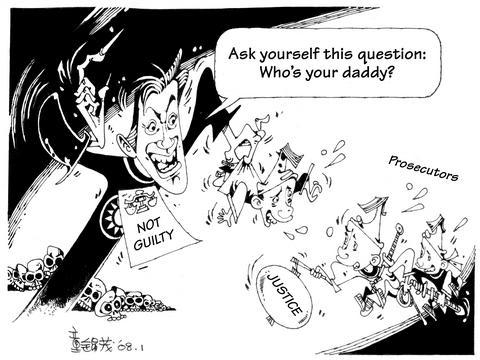Firm to
stop selling incorrect toy globe
CHINESE PROPAGANDA: Beijing
refused to allow the toy globes to be made in China unless Taiwan was shown to
be part of the People's Republic of China
AFP, TOKYO
Friday, Jan 11, 2008, Page 2
|
|
| This combo picture
shows the talking ''Smart Globe,'' which shows ''China-ruled Taiwan
Island'' in accordance with Beijing's instructions. PHOTO: AFP |
An educational globe toy portraying Taiwan as a part of China at the
insistence of Beijing is to be withdrawn, the Japanese firm that makes it said
yesterday.
The talking "Smart Globe," aimed at Japanese children, gives information about
countries when they are touched.
The ?29,400 (US$270) globe, manufactured in China by Japan's Gakken Toys Co Ltd,
a subsidiary of Gakken Co Ltd, proved to be popular, with the first batch of
10,000 quickly selling out after its release last year.
The globe shows "Taiwan Island" and says that it is "the People's Republic of
China," the official name of communist China.
Gakken said it had received complaints and apologized for its "inappropriate
expression and display" on the globe.
"We deeply apologize for causing a tremendous nuisance," the company said in a
statement.
It said it had advised subsidiary Gakken Toys to stop selling the globe. The
group will offer full refunds starting next week for those already sold.
A Gakken spokesman said the company had initially planned simply to display
"Taiwan," as is standard in Japanese school textbooks, but Beijing intervened.
"The place of production was China," he said. "The Chinese government's stance
was that we could not export unless we changed the expression."
"We obeyed it although we had wavered on if we should follow the Chinese
instructions or give up" on the product, he said. "We have faced accusations
that we lack common sense."
A similar globe by another Japanese manufacturer does not speak even if the user
touches Taiwan.
Japan only recognizes Beijing, which considers Taiwan to be as a part of China.
Since it switched diplomatic recognition from Taipei to Beijing in 1972, Tokyo
has barred official contacts with Taiwan, a former Japanese colony, even though
Taiwan enjoys widespread sympathy among Japanese conservatives.

Politicians may need to step back to go forward
By Paul Lin 林保華
Friday, Jan 11, 2008, Page 8
RECENT TV COMMERCIALS by the Chinese Nationalist Party (KMT) make me worry about
Taiwan's future. How can it be OK for the KMT to use its party assets to distort
facts? It professes to love Taiwan while making it look bad. Its ideology is
pro-China and anti-Taiwan.
Look at their claim that the economy is so bad people can't make ends meet.
China sees tens of thousands of mass uprisings a year; Taiwan does not. Using a
scorched earth tactic, the pan-blue legislative majority blocks the budgets that
would develop Taiwan's economy and national security, and then blames the
government for being ineffective.
Then they say that Taiwan must therefore unify with China.
Should Taiwan really become a part of China, an empire of lies?
Unfair aspects of the election system were abolished after the authoritarian era
ended, such as electoral district divisions and the KMT using its party assets
to secure votes. The strong influence the party still has over the judiciary
makes the elections extremely difficult for the pro-localization democratic
pan-green camp. No matter how hard it tries, it cannot win a legislative
majority. It would be a catastrophe for Taiwan if the KMT, which works closely
with Beijing, won a two-thirds legislative majority.
The cooperation between the pro-China New Party and the forces in the KMT
supporting former chairman Lien Chan's (連戰) call to cooperate with China to
prevent Taiwanese independence are signs of China's influence. The huge funds
China uses to win over Taiwan's diplomatic allies is clearly aimed at helping
the KMT create an image of the government as diplomatically incapable.
Taiwan is the only democratic country in the world that has a presidential
candidate like the KMT's Ma Ying-jeou (馬英九), who calls on voters to give up
their democratic rights to vote in a referendum.
Is he a fit candidate for a democratic country?
Facing such a grim outlook, the pan-green politicians must consider their
options.
To win votes, candidates need to mobilize the public and appeal to moderate
voters. But pan-green voters also face the problem of whom to vote for, as
pan-green politicians are competing against each other. It's not easy to
accumulate enough votes to win a legislative seat, but with candidates attacking
each other, tens of thousands of votes are lost to the green camp if one of them
loses, and then the legislative seat is lost.
Two years ago, the Democratic Progressive Party won the Kaohsiung mayoral
elections by a razor-thin margin, resulting in a year of lawsuits. What if the
party had lost those few thousands ballots?
Pan-green politicians competing against each other -- regardless of what party
they represent or how well they are doing in polls -- must take the initiative
to step back and give their votes and their support to the opposing pan-green
candidate. At first this might seem to mean throwing away one's political
future, but it will benefit the pan-green camp and all of Taiwan. In any case,
it is far more preferable to letting a pro-Chinese party win these seats.
Doing so would create more room for Taiwan and take a candidate out of a
difficult situation while showing him or her as open-minded, sensible and
democratic, thus creating new possibilities for future elections.
Politicians need to move the public. Whoever steps back to make way for another
pan-green candidate will move both his or her own voters and those in other
districts, showing them that pan-green politicians truly fight for Taiwan's
future and not for themselves or for partisan benefits. Taiwanese will remember
a candidate stepping back for the greater good.
Paul Lin is a political commentator
based in Taiwan.